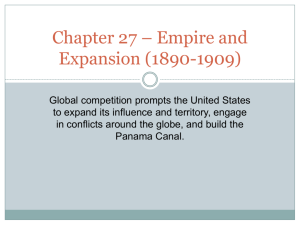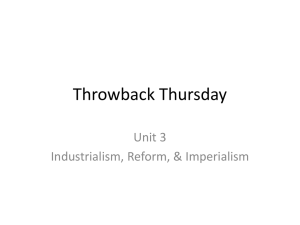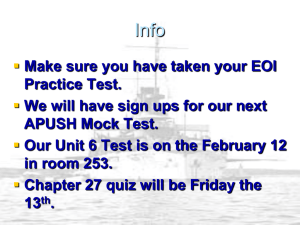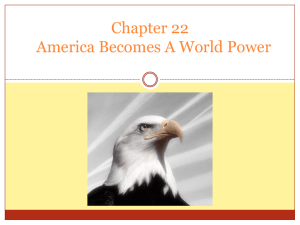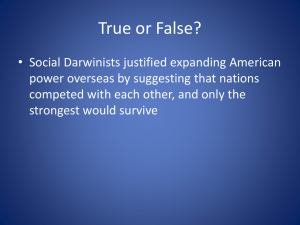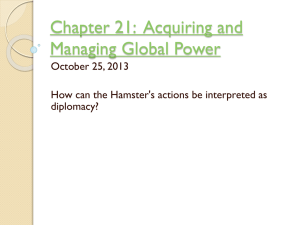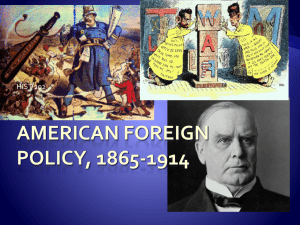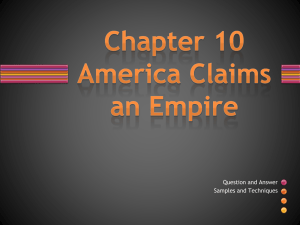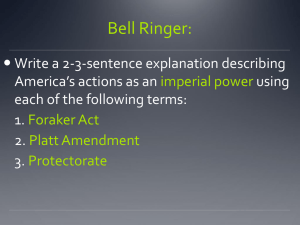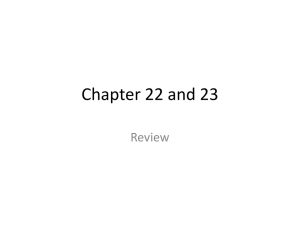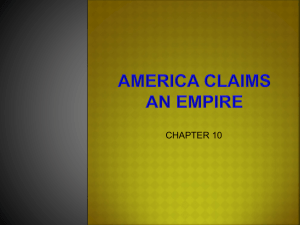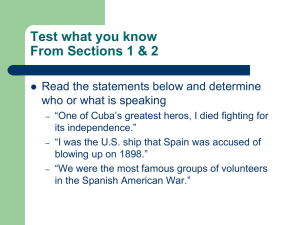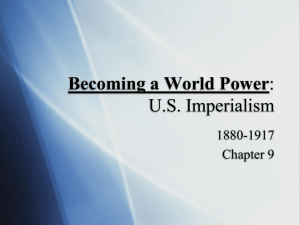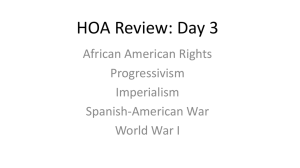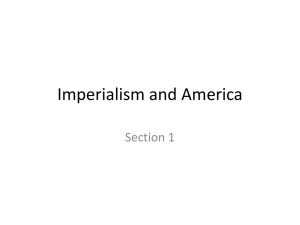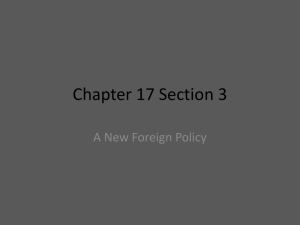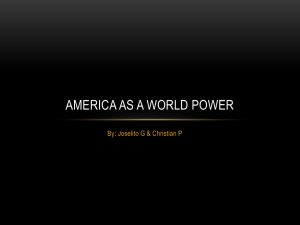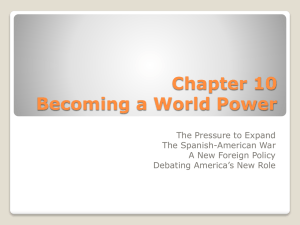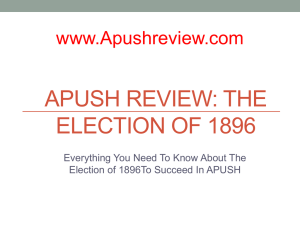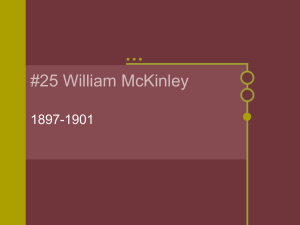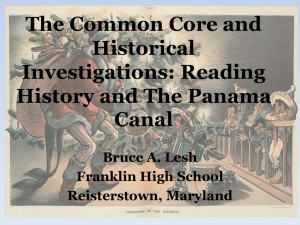Chapter 27
advertisement
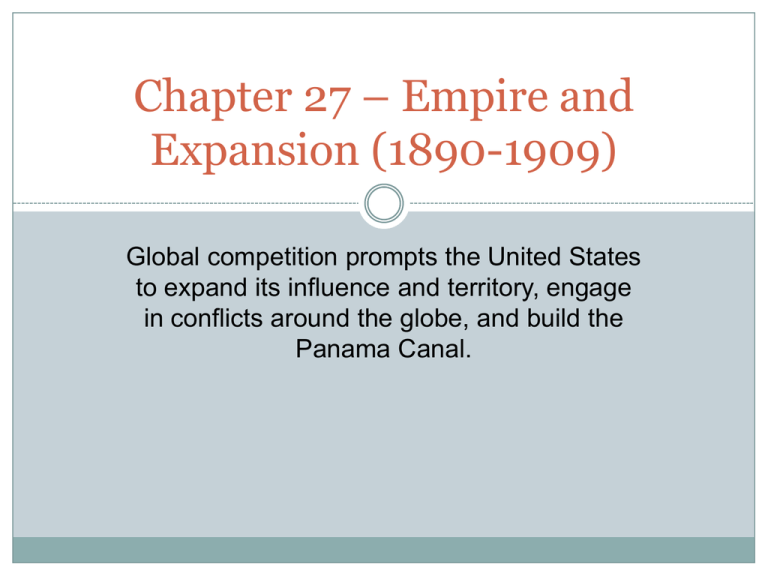
Chapter 27 – Empire and Expansion (1890-1909) Global competition prompts the United States to expand its influence and territory, engage in conflicts around the globe, and build the Panama Canal. American Turns Outward American tradition of isolationism (Washington’s farewell address) 1890’s expansionism to market US goods overseas Yellow journalism of Joseph Pulitzer and William Randolph Hearst Reverend Josiah Strong’s Our Country: It’s Possible Future and Its Present Crisis Strong spoke for civilizing and Christianizing savages Social Darwinism: US the fittest and needed to take over other nations to improve them Captain Alfred Thayer Mahan’s 1890 book, The Influence of Sea Power Upon History, 1660-1783 argued that every successful world power once held a great navy motivated the U.S. to look to expanding overseas Spanish-American War and Yellow Journalism Hawaii Treaties guaranteed commercial trade and U.S. rights to Pearl Harbor 1890, the McKinley Tariff raised the prices on profitable sugar trade Americans felt that the best way to offset this was to annex Hawaii—a move opposed by its Queen Liliuokalani—but in 1893, desperate Americans in Hawaii revolted in a successful coup President Cleveland believed coup was wrong and delayed annexation On the Hawaiian Islands, a group of American sugar planters under Sanford Ballard Dole overthrow Queen Liliuokalani, the Hawaiian monarch, and establish a new provincial government with Dole as president. The coup occurred with the foreknowledge of John L. Stevens, the U.S. minister to Hawaii, and 300 U.S. Marines from the U.S. cruiser Boston were called to Hawaii, allegedly to protect American lives. Americans overthrow Hawaiian monarchy Cubans Rise in Revolt 1895, Cuba revolted against Spain, citing years of misrule; America supported Cuba Spanish General Valeriano “Butcher” Weyler came to Cuba to crush the revolt; ended up putting many civilians into concentration camps American public clamored for action, spurred on by yellow press Accidental Maine Explosion kills 260 US soldiers yellow presses competed against each other to come up with more sensational stories War-mad Americans blame Spanish President McKinley privately didn’t want war Reluctantly, McKinley sends war message to Congress war with Spain seemed inevitable America had to defend democracy opposing a war could split the Republican party and America Congress also adopted the Teller Amendment: US promises to give Cubans their freedom after war with Spain Concentration camps of Cuban civilians by the Spanish Spanish-American War Spanish-American War starts in 1898 Assistant secretary of the Navy, Theodore Roosevelt had modernized the U.S. navy Roosevelt cabled Commodore George Dewey, commanding the American Asiatic Squadron at Hong Kong, and told him to take over the Philippines American troops arrived and captured Manila, collaborating with Filipino insurgents, led by Emilio Aguinaldo, to overthrow the Spanish rulers On July 7, 1898, the U.S. annexed Hawaii (so that it could use the islands to support Dewey, supposedly), and Hawaii received full territorial status in 1900 Victory against Spain American ground troops in Cuba ill-prepared for combat in the tropical environment The Rough Riders, a regiment of volunteers led by Roosevelt, rushed to Cuba; stormed up San Juan Hill US destroys Spanish fleet Easily take over Puerto Rico August 12, 1898, Spain signed an armistice; war lasts only 113 days Affirmed America’s presence as a world power But its actions after the war would lead to European jealousy and Latin American suspicion The Battle of San Juan Heights was fought on July 1, which Roosevelt called "the great day of my life." He led a series of charges up Kettle Hill and San Juan Heights on his horse, Texas, while the Rough Riders followed on foot. He rode up and down the hill encouraging his men with the orders to "March!" He killed one Spaniard with a revolver salvaged from the Maine. Other regiments continued alongside him, and the American flag was raised over San Juan Heights. Roosevelt's political career ignited as he returned a war hero and national celebrity. He charged on horseback to victory at Kettle Hill and San Juan Heights, and continued riding that horse all the way to the White House just three years later. Rough Riders America and Empire In negotiations in Paris, America got Guam and Puerto Rico and freed Cuba McKinley decided to keep the Philippines because of popular public opinion and because it meshed well with business interests (US paid $20 million) Actions in Philippines leads to an uproar The Anti-Imperialist League sprang into being, firmly opposed to American imperialism members: Mark Twain, Samuel Gompers, Andrew Carnegie Filipinos want freedom; denying that to them was un- American British writer Rudyard Kipling wrote about “The White Man’s Burden,” urging America to keep the Philippines and “civilize them.” The first Anti-Imperialist League was established on November 18, 1898. Membership was open to all citizens of the U.S. irrespective of party. Antiimperialists were eager to depict their movement as one that went beyond party politics. They courted Democrats, Republicans and independent mugwumps, but, interestingly, restricted membership to U.S. citizens. The League excluded foreign activists from joining. The Constitution "emphasized the purpose of the organizers to found the League primarily for the good of the people of the United States," and it specifically excluded Filipinos. League members argued that excluding foreigners was necessary to entice broad membership. Including foreigners among the membership would alienate those who held deep racial prejudices. Anti-Imperialism Puerto Rico and Cuba The Foraker Act of 1900 gave Puerto Ricans a limited degree of popular government, and in 1917, Congress granted Puerto Ricans full American citizenship U.S. help also transformed Puerto Rico and worked wonders in sanitation, transportation, beauty, and education In the Insular Cases, the Supreme Court said the island residents don’t share the same rights as Americans; allows Congress to do what it pleases In 1902, the U.S. walked away from Cuba, but it also encouraged Cuba to write and pass the Platt Amendment: the U.S. could intervene and restore order in case of anarchy the U.S. could trade freely with Cuba the U.S. could get two bays for naval bases, notably Guantanamo Bay Filipino Insurgency Filipinos had assumed that they would receive freedom after the Spanish-American War, but when they didn’t they revolted against the U.S in 1899 Aguinaldo took his troops into guerrilla warfare after open combat proved to be useless Stories of atrocities abounded (100s of thousands of civilians killed); the rebellion was broken in 1901 when U.S. soldiers invaded Aguinaldo’s headquarters and captured him The Americans tried to assimilate the Filipinos, but the islanders resisted; they finally got their independence on July 4, 1946 Personifying the United States, "Uncle Sam" chases a bee representing Emilio Aguinaldo, the President of the Philippine Republic on the Islands from March 22, 1897 to April 1, 1901. In 1901, two years after this cartoon's publication in America, Aguinaldo would surrender control of the Philippines to the United States. For the rest of his life, Emilio Aguinaldo wore a black bow in public to mourn his lost republic. On July 4, 1946, the United States granted the Philippines its independence and Aguinaldo removed his bow. Filipino Insurgency The Open Door in China Following its defeat by Japan in 1894-1895, China had been carved into spheres of influence by the European powers Americans alarmed…churches worried about their missionary strongholds…businesses feared they wouldn’t be able to export their products to China Secretary of State John Hay dispatched his Open Door Policy: urged European nations to keep fair competition open to all nations wanting to participate…saves China from being carved up like Africa In 1900, a super-patriotic group known as the “Boxers” started the Boxer Rebellion where they revolted and took over the capital of China, Beijing, taking all foreigners hostage, including diplomats After a multi-national force broke the rebellion, the powers made China pay $333 million for damages A French political cartoon depicting China as a pie about to be carved up by Queen Victoria (Britain), Kaiser Wilhelm II (Germany), Tsar Nicholas II (Russia), Marianne (France) and a samurai (Japan), while a Chinese mandarin helplessly looks on. China – Spheres of Influence Election of 1900 McKinley vs. Bryan again TR named McKinley’s VP running mate…Roosevelt’s active campaigning took a lot of the momentum away from Bryan’s Bryan’s supporters concentrated on imperialism—a bad move, considering that Americans were tired of the subject McKinley’s supporters claimed that if Bryan became president, he would shake up the prosperity that was in America at the time; McKinley won easily President Roosevelt 6 months after election, an anarchist Leon Czolgosz shot and killed McKinley Theodore Roosevelt the youngest president ever at age 42 TR promises to carry out McKinley’s policies TR’s motto: “Speak softly and carry a big stick” “The first modern president” While attending the Pan-American Exposition in Buffalo, New York, President William McKinley was shot twice by Leon Czolgosz, an anarchist. McKinley and his wife arrived at the exposition on September 5, 1901. He held several private receptions, a military review, and then delivered a speech. On the morning of September 6, the president visited Niagara Falls, and then returned to the exposition for a public reception. Waiting in line was Leon Czolgosz, the native-born son of Polish immigrants. Czolgosz fancied himself an anarchist after hearing a speech by Emma Goldman in 1898. However, he was not a member of any known anarchist organization, and was even suspected by them as being a spy. Anarchism in the late Nineteenth Century was an extension of the Marxist critique of Capitalism, combined with a desire to do away with the state as a form of government. This leftist philosophy sought to defend the rights of the working class against the ruling class, but saw the overthrow of the ruling class as a precursor to dissolving the state. Some revolutionaries used acts of terrorism (especially bombings) and assassination as a means of sparking revolution, and in the late Nineteenth Century, several heads of state had been assassinated by Anarchists. Czolgosz seems to have been inspired by the July 29, 1900 assassination of King Umberto I of Italy by an anarchist. McKinley Assassination Building the Panama Canal TR focuses on the creation of a canal connecting Atlantic and Pacific in Central America Canal would ease economic trade and defense of recent island acquisitions A Nicaraguan route was one possible place for a canal, but it was opposed by the old French Canal Company that was eager to build in Panama and salvage something from their costly failure there The U.S. negotiated a deal that would buy a 6-mile-wide strip of land in Panama for $10 million and a $250,000 annual payment but this treaty was retracted by the Colombian government, which owned Panama Building the Panama Canal (cont.) Revolution in Panama against Colombia begins; US fleet prevents Colombians from stopping it Panama was thus recognized by the U.S. Hay-Bunau-Varilla Treaty: gave a widened (6x10 mi.) Panamanian zone to the U.S. for $15 million TR didn’t actively plot to tear Panama away from Colombia, but it seemed like it to the public, and to Latin America, and his actions in this incident saw him suffer a political black eye In 1904, construction began on the Panama Canal; problems with landslides, sanitation, and disease The canal was finally finished and opened in 1914, at a cost of $400 million The Roosevelt Corollary Latin American countries falling behind on their European debt; Brit and Ger to send forces to make them pay TR saw this as a violation of the Monroe Doctrine Roosevelt Corollary no one could bully Latin America except the U.S caused resentment in L. Amer When U.S. Marines landed in Cuba to bring back order to the island in 1906, this seemed like an extension of the “Bad Neighbor” policy “Of course the best that can happen to any people that has not already a high civilization of its own is to assimilate and profit by American or European ideas, the ideas of civilization and Christianity, without submitting to alien control; but such control, in spite of all its defects, is in a very large number of cases the prerequisite condition to the moral and material advance of the peoples who dwell in the darker corners of the earth”. --Theodore Roosevelt (1909) Roosevelt and Imperialism Japanese Laborers in California After the war, many Japanese immigrants poured into California; fears of a “yellow peril” arose again 1906 San Fran earthquake…city claims a lack of space to place Asian children in separate schools (***connection to Jim Crow in the South) Becomes an international issue San Fran agrees not displace students if Japan would keep its laborers in Japan To impress the Japanese, Roosevelt sent his entire battleship fleet, The Great White Fleet, around the world for a tour

